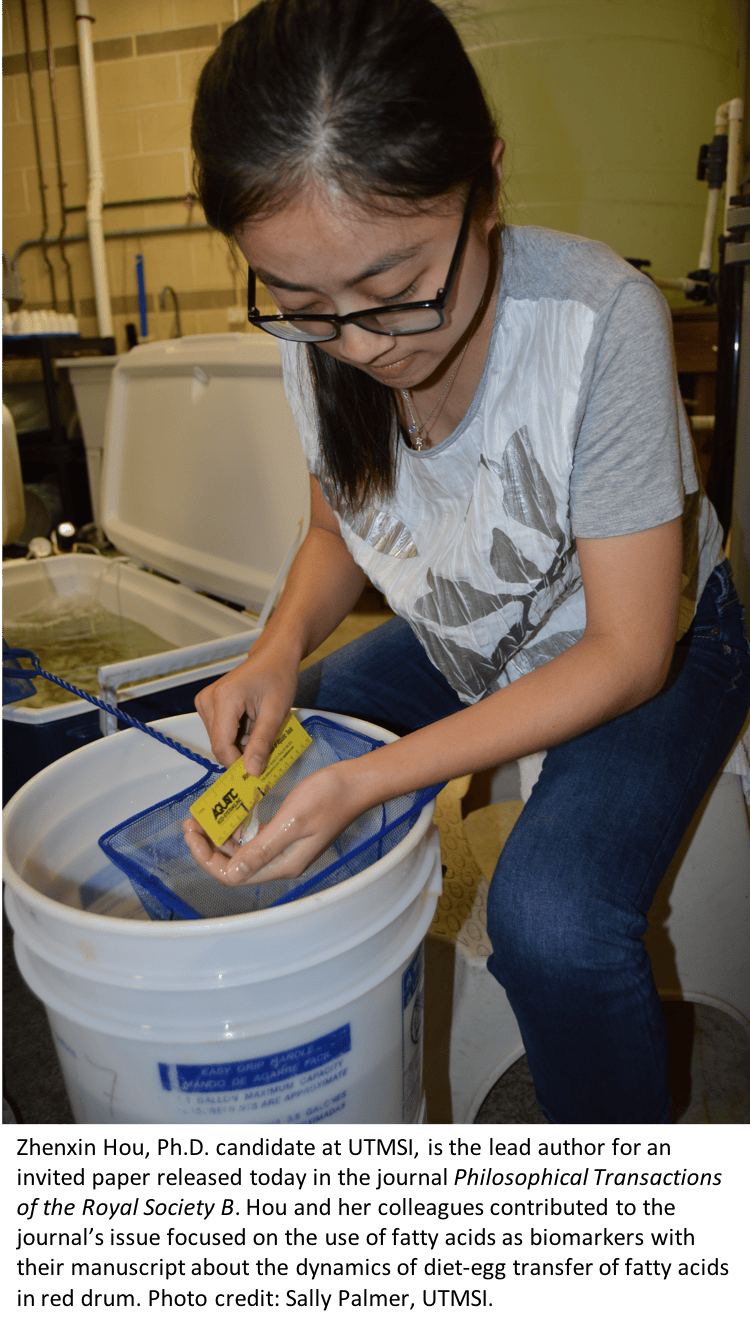Invited Paper contributes to Food Chain Understanding
 Fatty acids are essential to life, and almost every animal needs to get many of them from their diet. As such, they are great biomarkers to figure out who is eating whom in animal populations. In a new thematic issue released today “The next horizons for lipids as ‘trophic biomarkers’: evidence and significance of consumer modification of dietary fatty acids” by the journal Philosophical Transactions of the Royal Society B, specialists in this field present new research findings in a series of reports about the use of fatty acids as biomarkers, which will help refine our understanding of food chains. One of those invited reports was from UTMSI researchers Zhenxin Hou, Ph.D. candidate; Cynthia Faulk, Research Associate; and Dr. Lee Fuiman, Professor and Director of the Fisheries and Mariculture Laboratory.
Fatty acids are essential to life, and almost every animal needs to get many of them from their diet. As such, they are great biomarkers to figure out who is eating whom in animal populations. In a new thematic issue released today “The next horizons for lipids as ‘trophic biomarkers’: evidence and significance of consumer modification of dietary fatty acids” by the journal Philosophical Transactions of the Royal Society B, specialists in this field present new research findings in a series of reports about the use of fatty acids as biomarkers, which will help refine our understanding of food chains. One of those invited reports was from UTMSI researchers Zhenxin Hou, Ph.D. candidate; Cynthia Faulk, Research Associate; and Dr. Lee Fuiman, Professor and Director of the Fisheries and Mariculture Laboratory.
Hou and her colleagues’ research contributes to a greater understanding of how fatty acids flow through marine food chains by focusing on fish eggs, specifically those of red drum. When red drum spawn at Port Aransas every autumn, they produce hundreds of millions of eggs, which are loaded with fatty acids. The vast majority of those eggs are eaten by a variety of marine animals. Many of the fatty acids in those eggs came from the red drum’s diet. In their paper, released today, the researchers figured out which fatty acids came from the food that adult red drum ate within the past 30 days and which did not.
Determining which fatty acids in eggs come from the diet and how quickly that happens is essential for tracing the steps in the marine food chain. For example, a jellyfish or mullet that consumes red drum eggs might be getting fatty acids from the shrimp or crabs that adult red drum ate over the past month. Knowing these connections becomes especially important when major events, such as droughts and tropical storms, dramatically change food webs. By altering abundances of different animals, these events can reduce or increase the amount certain fatty acids in animal diets, which can affect the health and well-being of animals in the food chain.
This research was support by the Perry R. Bass Chair in Fisheries and Mariculture.